In a recent session held at the Abu Dhabi Court of Cassation on September 18, 2024, a pivotal commercial dispute was brought before the bench.
This case delves into the intricacies of conditional payments in subcontracting agreements, highlighting the critical legal principles surrounding obligations, suspensive conditions, and the enforcement of contractual terms.
Background of the Dispute
The dispute originated from a subcontracting agreement entered into between the appellant (a subcontractor) and the respondent (a main contractor), concerning the supply and installation of wooden doors and cabinets for a major construction project.
The subcontractor sought the recovery of AED 693,384.29, representing 10% of the contract value, which had been retained by the main contractor in accordance with the agreement’s terms.
Additionally, the subcontractor sought compensation for material and moral damages, as well as legal interest at the rate of 12% per annum.
The key contention revolved around a specific clause in the subcontracting agreement, which stipulated that 10% of the total contract value would be withheld and only released after the issuance of a final handover certificate for the project from the primary employer.
The subcontractor claimed that the work had been completed, yet the main contractor refused to release the retained amount.
Court of First Instance and Appeals Process

The subcontractor initially filed a claim in the Court of First Instance, which ruled in their favor, ordering the main contractor to pay AED 693,384.29 along with interest at the rate of 3% from the date of the judicial demand.
The main contractor, however, argued that the claim was premature, asserting that the final handover certificate, which was a prerequisite for releasing the retained amount, had not been issued.
As such, the payment was contingent upon the fulfillment of this condition. The main contractor appealed the decision, yet the Court of Appeals upheld the lower court’s ruling.
Dissatisfied with the outcome, the main contractor then brought the case before the Abu Dhabi Court of Cassation, contesting the decision on several grounds, including an alleged misapplication of the law and a failure to properly interpret the contractual terms.
Legal Issues at Hand
At the heart of this dispute lies the legal principle of a suspensive condition—an obligation that is contingent upon a future, uncertain event.
Articles 420 and 425 of the UAE Civil Transactions Law define a condition as an event that must occur before an obligation becomes enforceable.
In this case, the contractual clause clearly stated that the payment of the retained amount was conditional upon the issuance of the final handover certificate.
The main contractor’s argument rested on the assertion that the certificate had not yet been issued due to delays in related works, including the installation of utilities like gas.
Therefore, the retained amount was not yet due. The subcontractor, on the other hand, argued that the project had been completed to a substantial degree and that the refusal to release the funds constituted a breach of contract.
The Court of Cassation’s Ruling

Upon reviewing the case, the Abu Dhabi Court of Cassation found merit in the main contractor’s argument.
The court reaffirmed the principle that a party cannot be compelled to fulfill a contractual obligation if the condition precedent for that obligation has not yet occurred.
The court emphasized that, in cases where a subcontractor’s payment is contingent upon the main contractor receiving payment from the employer, the subcontractor’s right to claim the retained amount remains suspended until the main contractor has, in turn, received payment.
The court referred to the expert report, which confirmed that while the subcontractor had completed the contracted work, the final handover certificate had not been issued due to pending works and delays in the final inspection process.
As a result, the court ruled that the claim for the retained amount was premature, as the condition for its release had not yet been fulfilled.
Conclusion and Legal Implications
The Court of Cassation ultimately overturned the lower courts’ rulings and dismissed the subcontractor’s claim, holding that the contractual obligation to pay the retained amount was conditional upon the issuance of the final handover certificate.
The decision serves as a stark reminder of the importance of suspensive conditions in contracts, particularly in the construction and subcontracting industries.
This case underscores the significance of clearly defined contractual clauses, especially those that involve conditional payments.
It highlights the fact that parties to a contract must be fully aware of the conditions under which their obligations become enforceable.
The ruling also reinforces the principle that courts will uphold the explicit terms of a contract, provided they are lawful and agreed upon by both parties.
For legal practitioners and businesses alike, this case illustrates the critical need for precise drafting of contractual terms and the careful consideration of conditions that may affect the enforceability of obligations.
It also highlights the role of expert reports and technical assessments in resolving disputes over contractual performance and compliance with agreed-upon conditions.
In conclusion, the Court of Cassation’s decision offers valuable insights into the interpretation and application of conditional obligations in UAE law, particularly in the realm of commercial contracts and subcontracting agreements.
We at Khairallah advocates & legal consultants, are experts in dispute resolutions and can help our clients in all their legal cases. We offer a 30-min free legal consultation for everyone. Contact us today and let us handle the rest!





